Music Review: Matmos, The Ganzfeld EP
Published on October 30th, 2012 in: Current Faves, Music, Music Reviews, New Music Tuesday, Reviews |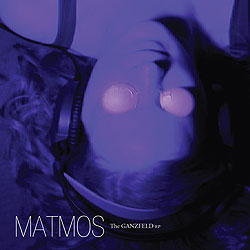
In their 20-year history of making music together, Drew Daniel and M. C. Schmidt have collaborated on some delightfully weird compositions, unusual instrumentations, and intimate, fun, and often frankly erotic live performances. The intervening years seem not to have blunted the drive towards innovation both in concept and result, even if The Ganzfeld EP contains two of the most straightforwardly danceable tracks Matmos has ever produced. There’s still plenty of experimental oddness and scientific detachment to go around, but the youthful provocation shows signs of approachable mellowing.
Music Review: Black Moth Super Rainbow, Cobra Juicy
Published on October 23rd, 2012 in: Current Faves, Music, Music Reviews, New Music Tuesday, Reviews |By Ricky Lima
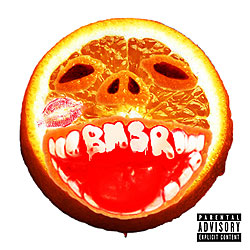
I’ve had the pleasure of introducing some of my friends to both Tobacco and Black Moth Super Rainbow over the years. I explain to them that both artists are fronted by the same person, and they usually comment that they don’t see much of a difference between the two. That is when I usually go into a rant about how BMSR is a more folk driven project with organic textures where as Tobacco is a more harsh sounding, hip hop-driven project.
After reading interviews with Tom Fec (the mastermind behind Tobacco and BMSR) it becomes clear that this kind of distinction drove Fec away from making more BMSR music. He felt boxed in by making his records sound like a Tobacco record or like a BMSR album and that there was no growth in making albums sound a certain way. After a very successful Kickstarter, however, Fec is back with a new BMSR album titled Cobra Juicy.
Music Review: Rick Berlin & The Nickel and Dime Band, Always On Insane
Published on October 23rd, 2012 in: Music, Music Reviews, New Music Tuesday |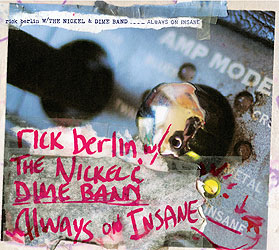
An old saying about the Champs-Elysses: If you stand on its corner long enough, you’ll run into someone you know. This adage is also true for Boston rock legend Rick Berlin‘s career. Berlin has honed his barbed sense of pop music over almost four decades, fronting the ambitious bands Orchestra Luna and Berlin Airport and playing a weekly residency at the drag bar Jacques Cabaret.
A series of very fortunate events positioned Berlin as an unlikely overnight success. A longtime fan sent him a check for $10,000 out of the blue, which allowed him to record his latest long-player, Always On Insane. Not long after its completion, rustic rock favorites Dr. Dog invited Berlin to open for them at their recent Boston engagement, introducing him to a younger audience.
Music Review: Peggy Sue Play The Songs Of Scorpio Rising
Published on October 9th, 2012 in: Current Faves, Music, Music Reviews, New Music Tuesday, Reviews |By J Howell
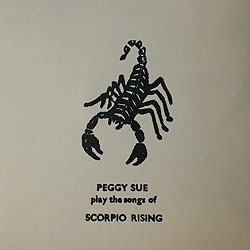
Following Peggy Sue‘s brilliant first two records, listeners may be a bit surprised by the band’s choice to (mostly) recreate the soundtrack from Kenneth Anger’s 1963 film Scorpio Rising as a next move. Somewhat predictably, though, the record is flat-out brilliant.
Modern music fans with a Phil Spector bent should take especial heed: Peggy Sue recreates, perhaps most importantly, the spirit of the original tracks while finding a sonic space for them to exist in that feels a bit more like alternate-universe versions of familiar songs than slavish imitation or heavy-handed “updating”. The band deftly walks the fine line between reproducing the original songs and making them their own, somehow managing to treat the “teenage drama” factor of many of the tracks with a respectful empathy that feels less melodramatic than urgent. Elsewhere, Scorpio Rising is just plain fun.
Music Review: Merchandise, Children Of Desire
Published on October 9th, 2012 in: Music, Music Reviews, New Music Tuesday, Reviews |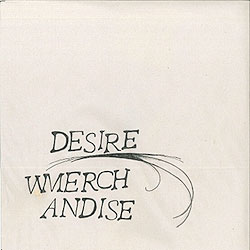
As much as I loathe music reviews featuring lazy equations like, “take one part [name of band] plus one part [name of other band] . . . ” in the case of Merchandise‘s Children of Desire, it does make for a good jumping off point. What separates Children of Desire from bands that are just a formulaic rehashing of previous, and far superior bands, is how they merge these styles and sounds to create something unique and bracing that doesn’t actually sound like anything else.
The album opens with “Thin Air,” a short, yet yearning piece that feels like an introduction for what’s to come. “Time” is longer, but still somewhat freeform in that it doesn’t rely on shopworn riffs or rhyming couplets. Singer Carson Cox has a rather idiosyncratic voice and delivery, ranging from falsetto to a deeper baritone; no matter how he’s singing, what registers is a sincerity and frankness that is offset by a combination of feedback, synths, processed drums, and subtle basslines that give these songs an oddly retro yet completely modern feeling.
Music Review: Holly Golightly & The Brokeoffs, Sunday Run Me Over
Published on October 9th, 2012 in: Current Faves, Feminism, Music, Music Reviews, New Music Tuesday, Reviews |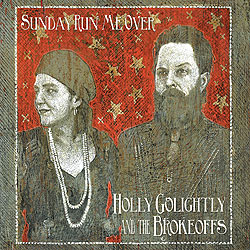
Country music—as a genre—has been a crapshoot for the last decade or so. For every Wayne Hancock or Justin Townes Earle that wade into the deep end of true country song craft, there’s a Kenny Chesney, Carrie Underwood, or Sugarland that claim the country mantle but are merely pop acts with lap steel.
That’s why I find a group like Holly Golightly & The Brokeoffs to be such a kick in the pants; they embrace instrumentation as if they were recording with the Carter Family, and give bear hugs to tradition. Holly, an Englishwoman by birth, delivers more twang than Loretta Lynn. Two songs in, you’d swear she just walked down from The Blue Ridge Mountains with her flour sack dress on, well-worn Bible tightly in her hand. It is a respite from the everyday, manufactured “country” backwash.
Sunday Run Me Over is the perfect companion to last year’s fantastic (and my #2 album of the year behind Foo Fighters’ Wasting Light) No Help Coming (reviewed here).
Music Review: Ty Segall, Twins
Published on October 9th, 2012 in: Current Faves, Music, Music Reviews, New Music Tuesday, Reviews |
Despite being astonishingly prolific, I’ve only gotten wise to Ty Segall‘s musical output recently; my album intro was June’s Slaughterhouse, performed with Segall’s touring band (reviewed here). Hearing Twins, recorded almost entirely by Segall himself, has proved he’s not a one trick pony. Twins hits the sweet spot between heavy guitar fuzz and pretty melodies and is immediately, deliriously enjoyable.
That’s not to say Twins is full of disposable pop songs. In these post-post-ironic times, it’s not uncommon for music fans to feel distrustful of something they like immediately, concerned about being manipulated by both our nostalgia and the desire for something that’s not a rip-off.
Music Review: Dark Dark Dark, Who Needs Who
Published on October 2nd, 2012 in: Current Faves, Feminism, Music, Music Reviews, New Music Tuesday, Reviews |
If Who Needs Who dropped in the early 1990s, Dark Dark Dark would have appeared in Sassy magazine’s “One to Watch” column. This band is the real deal. Frontwoman Nona Marie Imrie has a striking voice, their songs are catchy and insightful, and their arrangements and the spare production cast a spell over the listener. This Minneapolis-based quintet has a great album in them. The band’s third long-player isn’t quite that album.
Music Review: John Cale, Shifty Adventures in Nookie Wood
Published on October 2nd, 2012 in: Current Faves, Music, Music Reviews, New Music Tuesday, Reviews |By Emily Carney

John Cale turned 70 in March; however, his music proves to be age-proof with his new album, Shifty Adventures in Nookie Wood. Don’t ask; I have no idea about the title, either. Cale does have typically inscrutable album titles.
Usually when musical artists of any sort turn 70, they do endless “farewell” or “greatest hits” tours, or they engage in embarrassing collaborations with a very 1990s-sounding Metallica (I’m looking at you, Lou Reed. Yeah, I said it). Cale is doing neither, refuses to give into age, and is turning out impressive original compositions that aren’t at all dated or misguided. He’s only gotten better and more experimental as he’s gotten older.
Music Review: Timi Yuro, The Complete Liberty Singles
Published on September 25th, 2012 in: Feminism, Music, Music Reviews, New Music Tuesday, Retrovirus, Reviews |By Emily Carney

American singer Timi Yuro was described as “the little girl with the big voice,” lending her legacy nicely to future blue-eyed soul singers such as the late Amy Winehouse, Duffy, and Adele. However, Yuro’s influence spread like tree roots on both sides of the ocean; artists as disparate as Elvis and Morrissey considered themselves Timi Yuro fans. Her voice was also heard all over Northern Soul dance floors during the 1970s. Her career ended in the late 1960s with her marriage, but she had some impressive celebrity fans. Excellence never goes away, though.